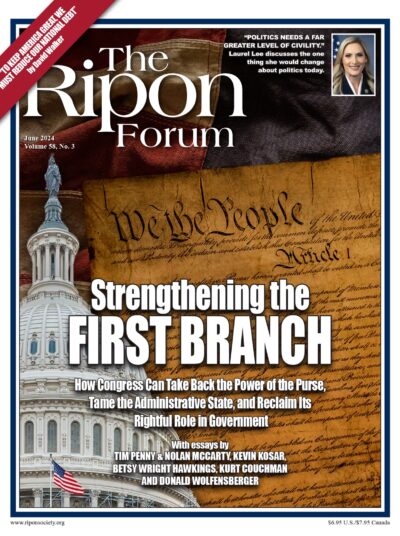
Congress is saturated with information. America’s best-resourced legislature has robust capacity too. Why, then, doesn’t Congress perform better?
It delays until problems become crises, lets waste persist, fails to modernize the laws, and excludes most members from deliberations. The ability of congressional committees to drive policy is weak, partly the legacy of using concentrated leadership power to break committee fiefdoms that existed before Republicans led by Newt Gingrich won control of the U.S. House of Representatives in 1994.
Congress exists to harness distributed knowledge, experience, and judgment to discover tolerable, mutual accommodations within the federal government’s proper scope. As that scope has sprawled, committees should have become even more important. Committee deliberation and specialization can provide opportunities to make legislative service rewarding and to solve problems.
The ability of congressional committees to drive policy is weak, partly the legacy of using concentrated leadership power to break committee fiefdoms that existed before Republicans led by Newt Gingrich won control of the U.S. House of Representatives in 1994.
Congress has two basic duties: designing programs and funding them. Yet Congress’ budget practices don’t work well. Few members can shape appropriations, the small share of the budget that gets regular review. The twelve Appropriations Committee bills fund important activities, but those activities include only 26 percent of spending and do not include taxes or borrowing.
Members of most committees have no regular way to affect budget outcomes, let alone manage programs holistically. Resolving minor issues requires major efforts, leaving bigger challenges unaddressed. Pressures are building, and the federal government is lumbering toward a debt crisis.
Fortunately, there is hope.
The Comprehensive Congressional Budget Act, for example, would create a real budget that includes everything. Each year, each committee would manage its direct spending and revenue portfolio within the budget resolution’s constraints. Authorizing committees would transmit their packages to the Appropriations Committees, where they’d get bundled with the appropriations bills and become the budget bill for floor consideration.
The CCBA would transform the budget resolution from a partisan messaging vehicle into a blueprint for governance. And if the House and Senate couldn’t agree to a budget resolution by April 15, the budget chairs would set committee limits from CBO’s baseline.
Likewise, one committee’s drama wouldn’t derail everything. If a committee deadlocks, the Appropriations Committee would insert that committee’s current-law line items as a placeholder.
This comprehensive budget would replace reconciliation. Meant to reduce red ink, reconciliation has become a tool of temporary, one-party control to avoid the Senate filibuster and, usually, to increase deficits.
A comprehensive budget’s committee-negotiated mini-deals where tradeoffs are real would let Congress chip away at problems each year. More opportunities to build ad hoc coalitions would improve the culture by encouraging collaboration and discouraging confrontation.
Committee deliberation and specialization can provide opportunities to make legislative service rewarding and to solve problems.
A budget cycle that starts and ends on time would be another big improvement. The Prevent Government Shutdowns Act would achieve this goal by forcing Congress to stay in D.C. and finish budgeting if it isn’t done before the fiscal year starts. Meanwhile, the country would be spared from shutdown disruptions. Needing to earn votes would push budgeting toward a more inclusive, bottom-up Congress with more room for members and committees to advance ideas.
Finishing on schedule would help the next cycle start on time. So would Congress requiring the president to submit his budget request and the national security strategy before giving the State of the Union address, as proposed in the SUBMIT IT Act. These reports give Congress and its committees useful information for each year’s budget and authorization legislation.
Defusing the debt limit and reclaiming emergency powers would reduce opportunities to bypass committees as well. In addition, the authorizing process could work better. To begin, each conference should explicitly instruct committee leaders to review and update laws in their jurisdictions. Otherwise, it’s too easy to let emerging issues crowd out making sure the laws are sensible.
Members and staff are often unsure which committee covers an issue. Each house should have a resource matching committees with the laws for which they’re responsible.
Reading congressional legislation is unusually difficult. Most state legislatures print bills showing proposed changes within the full sections of law they’d amend. The Readable Legislation Act would help Congress do the same.
Excessive hurdles may discourage members from developing and promoting legislation. House Rule 14(4) imagines that committee chairs take turns bringing reported measures to the floor. “Special rules” for taking up legislation displace that rule. Committee-driven floor scheduling could grease the skids for more creative updates to standing laws.
Committee deals are most likely to work for the entire body when committee membership is a microcosm of the whole. Better balancing regional, ideological, and other differences in each committee would free leaders from having to make and sell as many tough calls.
Finally, resource allocation matters. Senate committee membership and funding follow the ratios between the majority and minority caucuses. The House majority party has a disproportionate share of committee slots and two-thirds of each committee’s budget. The Senate approach preserves institutional knowledge and better aligns prospects for committee and floor approval.
Congress should make – and remake – federal policy, but it doesn’t use its vast resources effectively.
A better budget process and clearer paths to programmatic changes could make all the difference. Empowering the committees to drive policy could get many more members of Congress off the sidelines to solve problems for the American people.
Kurt Couchman is senior fellow in fiscal policy at Americans for Prosperity.




